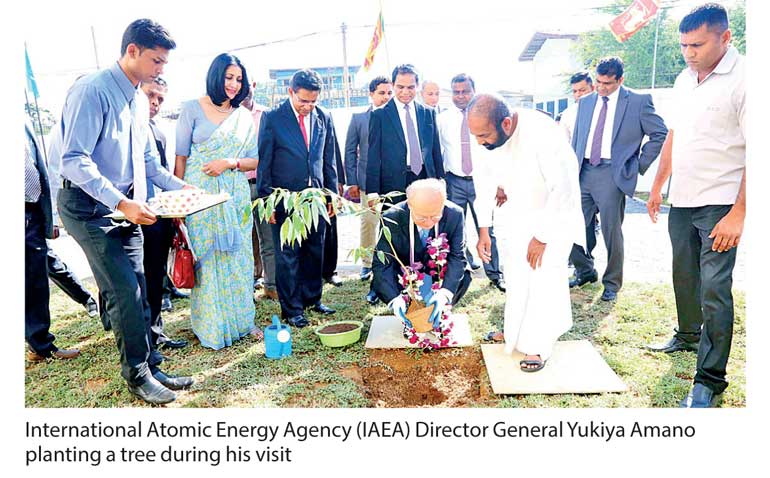Wednesday Feb 18, 2026
Wednesday Feb 18, 2026
Friday, 16 March 2018 00:00 - - {{hitsCtrl.values.hits}}

International Atomic Energy Agency (IAEA) Director General Yukiya Amano yesterday met with top officials during a visit to Sri Lanka and discussed ways to take forward cooperation between the organisation and the Government.
Director General Amano visited the National Center for Non Destructive Testing (NCNDT) and Sri Lanka Gamma Center of Sri Lanka Atomic Energy Board which are two scientific centers established with the collaboration of the IAEA.
He also visited the Sri Lanka Atomic Energy Regulatory Council and discussed how nuclear technology could be used to help Sri Lanka achieve its Sustainable Development Goals (SDGs) as well as tackle major development challenges in climate change and food security.
“We are working on sustainable development goals. The IAEA transfers nuclear technology to developing countries so they can use it to solve their challenges. We provide equipment, training and we are very happy about that,” he said.
He also said that the IAEA would work with the Government to understand the cause of the chronic kidney disease in the dry zone as nuclear technology is “very effective” in identifying pollutants and other material in water.
“We are ready to help Sri Lanka but we have decided to further strengthen our activities to identify elements contained in the water and if the water is not safe enough why not find them fresh water that is safe for the population. People do not know but nuclear technology is used everywhere, from the ipad to tires. It is very useful to protect health and the environment.”
However, since these capacities are not known they are not extensively used around the world to help countries solve their development challenges, Amano said. Such coordination would continue, including in the possibility of power generation, which the Director General insisted would be a decision that Sri Lanka would have to make but could seek technical assistance from the IAEA for execution.
IAEA is an independent intergovernmental, science and technology-based organisation established in 1957 in the United Nations family that serves as the global focal point for nuclear cooperation and assists its Member States, in the context of social and economic goals, in planning for and using nuclear science and technology for various peaceful purposes, including the generation of electricity, and facilitates the transfer of such technology and knowledge in a sustainable manner to developing Member States.
Sri Lanka has been a founding Member State of IAEA since 1957 and it receives technical assistance through the IAEA Technical Cooperation program in order to develop nuclear science and technology in the country.